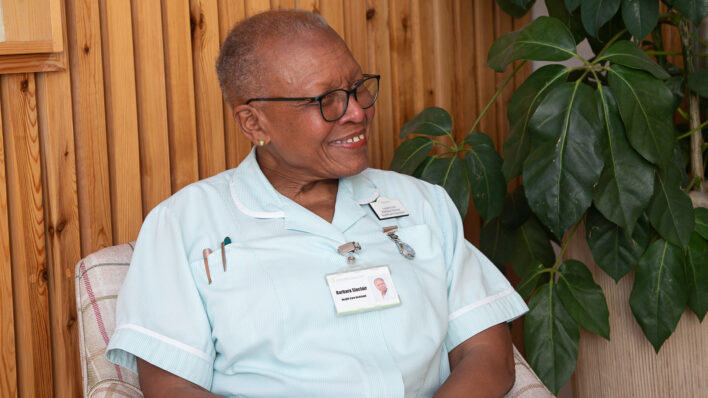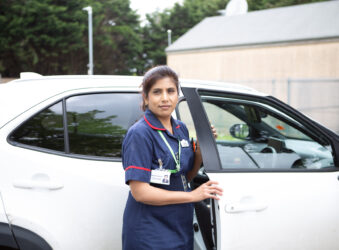Barbara Sinclair, Healthcare Assistant
Share this story

How long have you worked for the charity?
Just over 20 years.
Which departments do you work in now and which ones have you worked in before?
I started in the Inpatient Unit and then I did one day, in what used to be the Day Therapy Unit, which is now the Living Well Service and I spent 18 years there.
Last November [2022] it was a year since I left the Living Well Service and went back to the Inpatient Unit, working two nights a week.
How did you first hear about Arthur Rank Hospice Charity?
It’s interesting – prior to July 1998, I was an office worker, and I had a friend who bugged me to join a nursing agency – British Nursing Association (BNA) at the time, to do healthcare work. After much persuasion I did this, and I was sent to various locations; people’s homes, Addenbrookes and in July 1998, I came here [the Hospice] on a late shift. I thought, ‘My goodness, this place is different, it’s wonderful’ and I was hooked, and the rest is history.
What does a working day look like for you here?
Well, I start at night because that’s what I do mostly. Our handover starts at 7pm and goes on for about half an hour or more depending on the patients.
There are usually two Healthcare Assistants, along with three trained nurses, and we just go around the Inpatient Unit, making sure that people are comfortable, and asking; ‘Have you got everything you need?’, ‘Are you ready for bed?’
If they say, ‘ No, I’m not ready for bed, I’d like to sit in my chair a little longer’ I tell them ‘Fine, when you’re ready, just ring the bell, here it is.’
We do the rounds and settle everybody and then help the nurses, maybe check medication, that sort of thing.
There are various jobs that we do at night like, putting out linen, we have to do some dishes, fill the dishwasher, empty the dishwasher, little things like that.
What three words would you use to describe the Hospice?
Unusual, caring, and welcoming. Those three don’t do it justice but it’s everything you would want for your relative or for yourself in the time of need.
What do you mean by unusual?
Well sometimes when people come here, (especially if they’ve come from another health facility) they may be tense and not knowing what to expect, and you can see the tension [after a few days] it just seems to ebb away. They become relaxed and they get into the rhythm of the Inpatient Unit. I think it must be a very important thing for a patient.
When they ring their bell, they obviously need some help, and they ring their bell and in a few minutes, somebody’s there. That’s very reassuring I think and, in some cases, unusual for them to experience that!
Can you provide an example of a moment which surprised you, something that happened on the Inpatient Unit that was unexpected?
I think it was after a patient had died, a husband. His wife was extremely upset because something had happened to an item of clothing of his – maybe it had been washed, and she was extremely upset, because some people like to retain the garment for all the smells etc.
I remember going to her, really comforting her and telling her ‘It’ll be alright, we’ll fix it, you have nothing to worry about’.
I think that seemed to help the situation, and she later wrote me a very lovely note thanking me for all the help.
What would you say is the most rewarding part of your job?
When you are able to help a person to the extent that you see them relax and accept the care. Even if they’ve been afraid of coming into the Hospice, you talk to them gently and realise their fears, recognise them, and just try to put them at ease.
Yes, this has happened on several occasions.
You have a very calming nature about you which I’m sure the patients, the visitors, really absorb. Is that something that you have developed over time from being in this environment or is that just part of you?
It was here before. It’s always been there, yes, it has been told to me.
Somebody asked me in my office job many years ago ‘Are you a Christian?’ I said, ‘Yes, I attend church but it’s just me, this is just the way I am. I’m calm. I don’t flap!’ It helps in this environment.
Has working here changed you?
I’m sure it has, and any change has been positive.
I think I’m probably more relaxed about end of life because, as I say, death is a part of life and we have to accept it and it’s nothing to fear.
Yes, I think it’s my attitude towards the end. I’ve heard myself saying that if ever I come to the time where I am a Hospice Patient, I hope my time here has helped me to have the grace to just approach the end with calm.
Is there anything that still surprises you about hospice care?
Maybe families – because you’re dealing with people and everybody’s different.
They react differently in various situations and some reactions surprise. Though sometimes I say, nothing surprises me anymore!
Just reactions, people’s reactions in certain situations. I tell myself, the relative is grieving because they’re approaching a loss and it’s forever. You have to deal with that and it’s all sorts – especially if a patient has been estranged from the relative, such as a brother or a sister and at the last minute they’ve come together. You think, all that time is gone, you could’ve done so much in that time – but then I accept it’s life and we have responses to life as human beings.
What do you think the greatest challenge has been for the Inpatient Unit that you’ve witnessed.
I think for me, it all hinges on patients who make certain decisions regarding their future. Especially patients who are on life saving equipment when they decide, ‘I’d like that to end’. It’s a very difficult thing for some people to accept, especially the staff.
We’ve had cases in the past and my opinion is that we are employed to deliver care, and we deliver this care in an excellent matter.
I think ‘How dare we say that he or she should not have the right to what happens to them after? Because they’re the ones lying in the bed, they’re the ones suffering, and I think we need to acknowledge that and respect it.
What is the difference working in the Living Well service to working in the Inpatient Unit?
Well, the difference is the Inpatient Unit is sort of horizontal, you know. You’re in care and you need a certain amount of care, a certain type of care.
The Living Well Service, you come, you walk in, maybe. In some cases, you drive yourself there, in some cases the volunteer drives for you so it’s different and you come dressed.
Even if you came from the Inpatient Unit – because we encourage patients on the Inpatient Unit to come and spend a day in the Living Well Service – but you’ve got to be dressed. You can’t come in your dressing gown! You know, and for them I think it’s a good thing. Get dressed, put on a bit of lippy or whatever and come over and meet other people and you can exchange experiences.
What would you say to somebody who was contemplating working at the hospice, either on the Inpatient Unit or in the community?
Well, the first thing I’d ask them is, ‘What is your motivation? Why would you like to come?’ and then I’d certainly sing the praises of the Hospice and tell them to apply.
It’s a fantastic environment. Relatives, past relatives and patients say that. They say they’ve come here and there’s a certain calm in the place and it’s a very hospitable environment.
What would be your hope for hospice care in the future?
I hope it goes from strength to strength. I don’t see how much stronger it can get but that it certainly continues and I’d like to think that more and more people get to understand what hospice care is.
I’m sure there’s still people out there thinking, ‘Oh, if I go through those doors, I’m not coming back out’, and I think it’s an unfortunate thing. This was really illustrated to me in my Day Therapy [Living Well] days.
When we get new patients join the service, one of the first questions I used to ask them was: ‘How did you feel when your GP or District Nurse said, ‘I am going to refer you to Arthur Rank Hospice?’
I specifically remember one woman telling me, ‘I was terrified’, and I thought that was such a shame. I said to her, a few hours after she’d arrived, ‘How do you feel now?’ and she said, ‘It’s not too bad, I’ve relaxed’. I thought to myself all that time being terrified is a shame.
I was doing a course at the time, and it led me to produce a little booklet. I did discuss it with the patients at the time. This was my intention, ‘How do you feel?’, ‘Do you think it would help others coming to the Hospice?’ and it was an unanimous ‘Yes’.
They all wanted to give a comment in the booklet which I included. I thought the booklet should be very short. Not a lot of words because when you’re faced with problems, you can’t read a lot of words. The words can come later.
So my booklet started off with a picture of the Chaplain in his office and then a photo of the Receptionist. It had and views around the lounge showing our lovely armchairs, showing the Therapists, the volunteers sharing cake, and that sort of thing. It was very well received.
You look at it and you think, ‘Oh, it’s not too bad!’ and all that terror I think is taken away.
What would you say to somebody facing hospice care?
You need to fear nothing. You’re going to a very hospitable environment; a very caring environment and after a few days you will certainly see the difference from wherever it is you’ve come.
What keeps you here now after all this time?
I just love the work. I consider myself a people person and this is the place to meet people; all types – well and unwell. I just enjoy it and I think that’s what keeps me. I enjoy the work and I enjoy the people with whom I work.
If you would like to work for Arthur Rank Hospice Charity please see our vacancies on our ‘Work for Us’ page . We would love to hear from you.
View other stories
-

Sheetal Mahurkar
I am proud to be the Team Lead for Hospice at Home, North Team
-

Meet Joanna Zang, Bistro Assistant
Meet Joanna, our sunny Bistro Assistant
-

Janice Doyle, Part time Manager at the Regent Street Charity Shop
Janice is the Part time Manager at the Regent Street Charity Shop
-

Helen Sheppard, Regent Street Shop Manager
Helen Sheppard is the full time Manager at our shop in Regent Street in Cambridge




